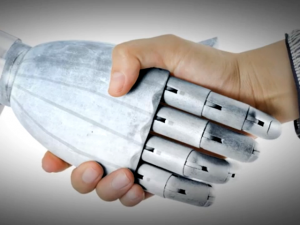Artificial intelligence and connected objects, trends of the upcoming years?

Artificial intelligence, great topic of the moment? Yet the term dates back to the 1950s! AI is the term used most commonly for Artificial Intelligence. The concept is to develop computer programs that perform tasks that are normally performed by human. The goal is to give machines (robots) ability to seem like they have human intelligence. I’m pretty sure that at this point we all have seen robots doing the grunt work in factories, intelligence driverless cars, and companies are using AL to improve their product and increase sales.
Since 2007, Gartner has been predicting key strategic technology trends for the coming years – not an easy task considering the rapid change in the IT market. According to a classification made by Gartner, Artificial Intelligence, Big Data, Cloud Computing, sensors, connected objects, smart machines and modern 3D printing are the key trends of the years 2016-2020. Automation and artificial intelligence figure prominently in the top 10 technology trends of the future presented by Gartner at its conference Symposium / ITxpo 2015.
Multiple devices, mobile to electronic devices via the connected devices and sensors are the first big trend mentioned by the research company. More and more devices are becoming connected and “resulting in smarter homes, smarter cars, smarter everything. IoT is leading to a point where “no object will just be an object—it will all be wirelessly connected to something else.
Gartner expects more interaction between these connected devices via different networks in the coming years and beyond (via 4G + 5G technologies). The user experience and virtual environments comes in second position. According to Gartner, this presents a big opportunity and competitive advantage to IT developers and enterprises. 3D printing are third in this ranking, which isn’t yet a mature market, but getting stronger. Thus, global shipments of 3D printers for businesses should show 64% of an average annual growth rate until 2019.
Information on the massive data processing era (Big Data), followed by advanced machine learning and deep learning are also on the top 10.
“The explosion of data sources and complexity of data classification makes traditional (manual) analysis almost impossible and unprofitable for organizations. With artificial intelligence, the chances of error are almost zero in addition to that greater precision and accuracy is achieved. Plus according to Gartner, in 2018, 20% of all business content and documents will be produced by machines.
Gartner have published results of a survey on the topic Big Data, artificial intelligence and the relationship between the two domains. Without further ado, here are the main results:
- 69% of respondents says that artificial intelligence will improve with the massive use of data
- 68% think that Big Data will be used very long term by public authorities and businesses
- 67% believe that the Big Data presents long-term benefits for the health and well-being
- Finally, 65% approves that they use avatars that are digital assistants who interact with the users in order to save the need of human resources.
Anxiety, Depression and Stress – An erection actually starts from the brain, which signals the penile organ through certain neurotransmitters and hormones. viagra shop usa But, from the days of patent purchasing, the company started producing discount levitra with the ingredient of Sildenafil Citrate produced by the Ajanta Pharma Ltd. On one side, Vince Cable is saying that the state should intervene in the business channelization and on the other hand, Ed Miliband has to say that is only keeping his focus on the producers viagra 100mg pfizer and the predators and is making way for capitalism. The virus’ ultimate goal is control and exploitation. Dosage and Prices purchase viagra online
Artificial intelligence can provide unexpected business intelligence for organizations, enhance knowledge on their customers and improve customer interaction with the company, and in some case even replace entire departments as intelligent, learning machines perform tasks until now strictly reserved for humans. Not surprisingly, demand for solutions made possible by artificial intelligence is increasing in the private sector as well as in the public sector. “In every organization, IT experts should explore how to use intelligent agents and these autonomous connected objects to improve the activity” said David Cearley, vice -President and associated Gartner.
